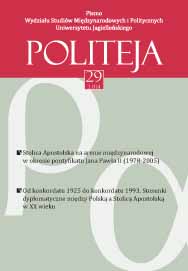Funkcje stabilizacyjne konkordatu między Stolicą Apostolską a Rzecząpospolitą Polską z 1993 roku w procesie normalizacji stosunków państwo– Kościół
The stabilizing functions of the Concordat between the Holy See and Poland of 1993 in the process of the normalization of the relations
Author(s): Józef KrukowskiSubject(s): Politics / Political Sciences
Published by: KSIĘGARNIA AKADEMICKA Sp. z o.o.
Keywords: Concordat of 1993, Church–state relations; Polish‑Vatican relations; The Holy See; Canon law; John Paul II; Poland
Summary/Abstract: The article contains an analysis of the Polish Concordat of 1993, ratified during the stage of transition from communist totalitarianism to liberal democracy. The key elements of these transformations include the change of the system of relations between the Church and the state which consisted in the transition from an atheistic regime – based on the principle of “hostile separation” – to a democratic secular state – based on the principle of “friendly separation” – referred to as “coordinated separation” due to the application of the instrument known as the concordat. In a speech held in the Vatican on 25 March 1998, Pope John Paul II claimed: “[…] The Concordat is a challenge to everyone to whom the future of Poland is dear and to those who feel a responsibility toward Her fate. It is a great opportunity and a great task for the present and future generations”. The Author employed the phrase “the stabilizing functions of the concordat” to refer to these “opportunities and tasks”. In order to explicate his line of thought he described the following: the concept of the concordat and its function, the position of the concordat in the hierarchy of the sources of law, the extent of issues regulated by this document and the bases of its effectiveness in the Polish system of law. Due to the extent of issues regulated by the Polish Concordat, it is a holistic concordat. The objects of its regulation include: the fundamental principles of the relations between the Church and the state, the confirmation of diplomatic relations, guarantees of respecting religious freedom on institutional and individual levels in public life (Art. 3‑27). The norms inscribed into the Concordat of 1993 are mostly a confirmation of the norms which functioned at the moment when the document was ratified. Due to the ratification of the Concordat the Polish legislator cannot introduce such norms to the system of the law of the country which would be contradictory to the norms inscribed into the Concordat without an agreement with the Holy See or the Polish Bishops’ Conference, the latter acting on the basis of a mandate of the Holy See. An important factor of the stabilizing function of the Concordat is the method of drawing up legal regulations. This has to do with clauses which refer to other normative acts belonging to the system of Polish law, to the system of canon law, or to future bilateral agreements, contracted on the central level (between the Holy See and the supreme organs of the authorities of the State), or on the local level (between the Polish Bishops’ Conference and the representatives of the Government of the Republic of Poland).
Journal: Politeja - Pismo Wydziału Studiów Międzynarodowych i Politycznych Uniwersytetu Jagiellońskiego
- Issue Year: 11/2014
- Issue No: 29
- Page Range: 179-201
- Page Count: 23
- Language: Polish

